新目标八年级英语下册Unit1教案
人版新目标八年级英语(下册)全册电子版教学案
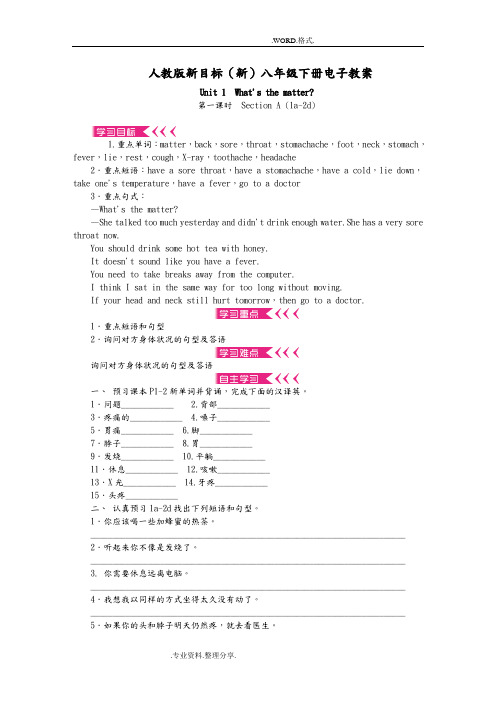
人教版新目标(新)八年级下册电子教案Unit 1What's the matter?第一课时Section A (1a2d)1.重点单词:matter,back,sore,throat,stomachache,foot,neck,stomach,fever,lie,rest,cough,Xray,toothache,headache2.重点短语:have a sore throat,have a stomachache,have a cold,lie down,take one's temperature,have a fever,go to a doctor3.重点句式:—What's the matter?—She talked too much yesterday and didn't drink enough water.She has a very sore throat now.You should drink some hot tea with honey.It doesn't sound like you have a fever.You need to take breaks away from the computer.I think I sat in the same way for too long without moving.If your head and neck still hurt tomorrow,then go to a doctor.1.重点短语和句型2.询问对方身体状况的句型及答语询问对方身体状况的句型及答语一、预习课本P12新单词并背诵,完成下面的汉译英。
1.问题____________ 2.背部____________3.疼痛的____________ 4.嗓子____________5.胃痛____________ 6.脚____________7.脖子____________ 8.胃____________9.发烧____________ 10.平躺____________11.休息____________ 12.咳嗽____________13.X光____________ 14.牙疼____________15.头疼____________二、认真预习1a2d找出下列短语和句型。
八年级英语下册Unit1What'sthematterSectionB课件(新版)人教新目标版

3. _____________ 登山者;攀登者 4. ____c_l_im__b_e_r___ (交通)事故;意外遭遇
5. ____a_c_c_i_d_e_n_t__ 千克;公斤
6. ______k_il_o_____ 岩石 7. ______r_o_c_k____ 刀 8. _____k_n_if_e_____ 血
第九页,共36页。
I'm never interested in watching crosstalk. 我从来不曾对观 看相声表演感兴趣。 【熟记(shú jì)】take/have an interest in (doing)…=be/get/ become interested in (doing)… 对(做)……感兴趣 places of interest 名胜
英语(yīnɡ yǔ) 八年级 下册 配人教(新目 标)版
Unit 1 What's the matter?
Section B
第一页,共36页。
课前预习
一、重点单词 1. _____k_n_e_e_____ 膝;膝盖 2. _____________ (we的反身代词(fǎn shēn dài cí))我们自己
继续或坚持做某事
23. havkeeeap_______o_n__ ___________遭遇(zāoyù)严重意外
24. go ______s_e_r_io_u_s_____a__c_c_id_e去n爬t 山
25. _____m_o_u_n_t_a_in_____放cl弃imbing
give
up
第六页,共36页。
usually offered tea by the host. (2016长沙)
英语新目标八年级下册unit 1 Will people have robots 课文及导学案

Unit 1 Will people have robots? 课文及导学案SECTION A1a SENTENCES1.People will have robots in their homes.2.People won‟t use money. Everything will be free.3.Books will only be on computers, not on paper.4.Kids won‟t go to school. They‟ll study at home on compute rs.5.There will only be one country.6.People will live to be 200 years old.1c PAIRWORKA: Will people use money in 100 years?B: No, they won‟t. everything will be free. Will people live to be 200 years old?A: Y es, they will.Grammar Focus—Will there be less pollution? —No, there won‟t. There will be more pollution.—Will there be fewer trees? —Y es, there will.—Kids won‟t go to school. Kids will study at home on computers.3aFive years ago, Sally was in high school. She played soccer. She had a cat.Today, Sally is in college. She plays the guitar. She has a dog.In five years, Sally will be a doctor. She will play tennis. She will have a car.SECTION B3aIn ten years, I think I‟ll be a reporter. I‟ll live in Shanghai, because I went to Sh anghai last year and fell in love with it. I think it‟s really a beautiful city. As a reporter, I think I will meet lots of interesting people. I think I‟ll live in an apartment with my best friends, because I don‟t like living alone. I‟ll have pets. I can‟t have any pets now because my mother hates different pets.I might even keep a pet parrot. I‟ll probably go skating and swimming every day. During the week I‟ll look smart and probably will wear a suit. On the weekend, I‟ll be able to dress more casually. I think I‟ll go to Hong Kong on vacation, and one day I might even visit Australia.SELF CHECK2 Predicting the future can be difficult. There are many famous predictions that never came true. Before 1929, there was no sound in movies. The head of one of the biggest movie companies in the United States predicted that no one would want to see actors talk. Of course, he was wrong! In 1977, the head of the largest computer company in the United States said, …“No one will want to have a computer in his or he r home.” He thought that computers would never be used by most people.SECTION 2 While Y ou ReadDo you think you will have your own robot?In some science fiction movies, people in the future have their own robots. These robots are just like humans. They help with the housework and do the most unpleasant jobs.Some scientists believe that there will be such robots in the future. However, they agree it may take hundreds of years. Scientists are now trying to make robots look like people and do the same things as us. Japanese companies have already made robots walk and dance. This kind of robot will also be fun to watch.But robot scientist James White disagrees. He thinks that it will be difficult for a robot to do the same things as a person. For example, it‟s easy for a child to wake up and know where he or she is. Mr. White thinks that robots won‟t be able to do this. But other scientists disagree. They think that robots will be able to talk to people in 25 to 50 years.Robot scientists are not just trying to make robots look like people. For example, there are already robots working in factories. These robots look more like huge arms. They do simple jobs over and over again. People would not like to do such jobs and would get bored. But robots will never get bored.In the future, there will be more robots everywhere, and humans will have less work to do. New robots will have many different shapes. Some will look like humans, and others might look like snakes. After an earthquake, a snake robot could help look for people under buildings. That may not seem possible now, but computers, space rockets and even electric toothbrushes seemed impossible a hundred years ago. W e never know what will happen in the future!语法精讲(一)一般将来时1.主语+am/ is/ are going to +动原do2.主语+助动词will+ do (若主语为第一人称,也可用I/ We + shall do)3.部分动词如:come, go, leave, move, start, arrive, fly等常用进行时结构be+ doing 表示将来;4.表示将要有……, 用:There is/ are going to be +主语+其他;或There will be +主语+其他;E.g.: People will have robots in the future.否:People robots in the future.一般疑问句:people robots in the future?回答:Y es, . / No, .划线提问:people in the future?同义句:People robots in the future.(二)many/ much—more—most 表数量多,可修饰可数名词复数或不可数名词few—fewer—fewest 表数量少,只修饰可数名词复数little—less—least 表数量少,只修饰不可数名词用上述词的适当形式填空:1.They’ll do their work well with money.2.There are / buildings in our city than their city.3.There will be pollution if we plant trees.4.There are too many people here. It’s too crowded.5.I feel better now.6.He’s new here. He has friends, does he?(三)alone: adj./ adv. 表示形体上“单独的,独自地”lonely: adj. 表示精神上“孤独的,寂寞的”1.She is afraid to go out at night.2.It’s hard for him to finish the work .3.She lives and that makes her feel sometimes.(四)except: prep. 除……之外;(不包含…)All the students finished the homework except Nick. (指Nick未完成作业)She goes to work every day except Sunday. (Sunday 除外)(五)It‟s +adj.+ for sb. to do…= 主语+find (think, believe…) it +adj. to do…对某人来说做…太…了E.g.: Maybe these children find it hard to think for themselves when they’re older.= Maybe it’s hard for these children to think for themselves when they’re older.基础夯实一.根据音标和句意拼写单词1.I think r will do housework instead of people.2.Money is important, but money isn’t3.He / / a letter to his brother yesterday.4.He is a worker. He works in a5.Don’t worry about me. I can look after / /.6.He is too young to himself.二、选择填空:1.I saw a boy when I walked along the river.A. swimB. to swimC. swimmingD. swims2.are going home on a train.A. Mr. TurnerB. Mr. Turner’sC. The TurnersD. The turners’3.All the fruit is free. Y ou can eat .A. as many as possibleB. as much as possibleC. as more as possibleD. as many as possibly4.We need time and freedom ourselves after whole day’s work.A. relaxB. relaxesC. relaxingD. to relax5.We find easy to get along with him.A. isB. itC. thisD. that6.Wang Liqin the national team in 1998 and then he a lot of ping pong matches.A. joins; takes part inB. joins; took part inC. joined; takes part inD. joined; took part in7.People use money to buy food, books, bicycles and other things they need.A. a hundred ofB. hundreds ofC. two hundreds ofD. hundred of8.We’ll go for a picnic if it this Sunday.A. don’t rainB. doesn’t rainC. won’t rainD. isn’t raining9.Are you here on business or fun?A. inB. onC. atD. for10.The TV program was very and we all got .A. boring; boredB. bored; boringC. bored; boredD. boring; boring11.To be here at Christmas time is a dream that has .A. be trueB. comes trueC. come trueD. came true12.Please who broke the window.A. findB. look forC. look atD. find out13.I will see you on the moon .A. a dayB. every dayC. one dayD. everyday14.There will a concert in our city.A. haveB. hasC. isD. be15.—Do you like the city life or the country life?—It’s hard to say. In the city it is interesting, but in the country there is pollution.A. less; moreB. more; lessC. more; fewerD. much; much16.My life will be better than it is now.A. a lotB. a lot ofC. a fewD. more17.What will happen to our human 100 years from now?A. 100 years agoB. 100 years before nowC. since 100 years agoD. in 100 years18.This coat doesn’t fit him well, as he has a huge body and the coat is small.A. so; suchB. so; soC. such; suchD. such; so三、用括号内所给词的适当形式填空We can see robots in some places. There are robots 1 (work) in factories. They do simple jobs over and over again. People don’t want 2 (do) such jobs. In some restaurants, we can see robots 3 (say) hello to people or serving dishing. Japanese companies have already made robots (walk) and dance. It’s fun 5 (watch). In the future, there (be) more robots everywhere, and humans will have (little) work to do.四、句型转换1.There is going to be a new building here in 2 years. (同义句)There a new building here 2 years .2.She can sing the song in French. (同义句)She the song in French.3.It took her 500 yuan to buy the ticket. (同义句)She 50 yuan / the ticket.She 50 yuan the ticket.4.My parents will go to Beijing in two years. (对划线部分提问)your parents to Beijing?5.He seems to like this book. (同义句)he likes this book.6.Cities will be big and crowded in the future. (否定句)Cities very big crowded in the future.7.We’ll go out for a walk with you. (同义句)We out for a walk with you.8.The weaher will be sunny tomorrow. (对划线部分提问)the weather tomorrow?五、完成句子1.学习使用计算机对你有好处。
人教新目标八年级英语下册教案Unit1Whatsthemat教案

Unit1 What’s the matter?复习课教学设计一、设计背景初中英语升学考试所涉及的知识面广,因而复习时需要扎扎实实打好基础,对课本的复习可以说是以“地毯式”搜捕的方式进行的。
教师要在有限的时间内完成如此大容量的复习任务,就必须要想方设法提高复习效率,让学生的复习取得事半功倍的效果。
我在复习中采用“知识递进式”复习法,用话题带动词句的使用,注重知识的综合运用。
二、设计理念本课是以“problems and advice”为话题的复习课,课堂上把主动权交给学生,以听说训练为主线,通过看、听、说、写等一系列教学活动,让学生运用所学知识来完成单词拼写、即时翻译短语、小组合作翻译句子,定时背诵语篇。
使学生获得最基本的英语听、说、读、写能力,并在教学中充分激发学生强烈的学习愿望。
在注重学生知识能力发展的同时,注重提高学生的人格修养,学会关心别人,帮助别人,达到培养学生互助的德育教育的目的。
三、教学目标设计用具体、明确、可操作的行为语言,描述本课的知识、技能、能力、方法、情感、态度、价值观等方面的教学目标。
Objectives: By the end of the session, most students will be better able to acquire the required information. This will be achieved by: 1.Knowledge Objectives:1)Be able to master the pronunciation, meaning and spellingof the names of diseases: fever, sore throat, sore back; stomachache, headache, toothache, cold, cough; 2) Be able tolearn the e某pressions of giving advice: lie down and rest, drink hot tea with honey, see a dentist, take this medicine;3) Be able to talk about health problems by using “What’s the matter? I have a?” and give advice by using “Youshould?You shouldn’t?” 2. Ability Objectives:1) Be able to talk about one’s health problems and give advice fluently; 2) Be able to role play doctor and patient; 3. Moral Objectives:1) Improve the cooperative spirit through pair work and role playing 2) Care more about yourself and your family members’ health. 四、教学重点难点设计由于本节课的话题是谈论健康,根据教学大纲的要求,学生需掌握有关疾病的单词,并能针对疾病提出合理的建议。
新目标八年级下册全册英文教案Unit 1-10
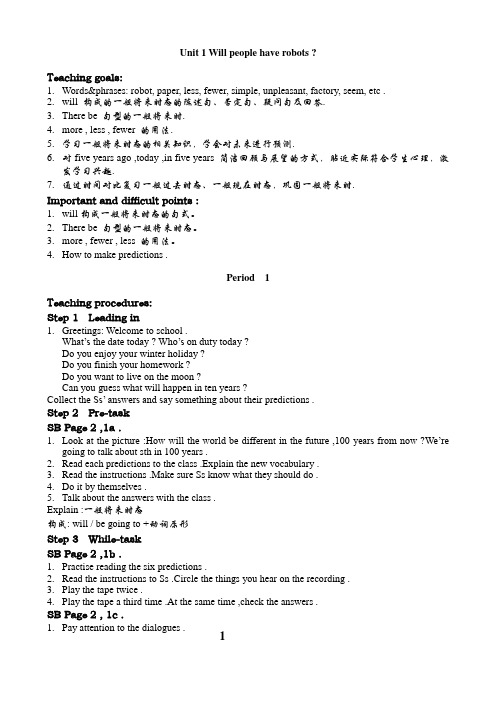
Unit 1 Will people have robots ?Teaching goals:1.Words&phrases: robot, paper, less, fewer, simple, unpleasant, factory, seem, etc .2.will 构成的一般将来时态的陈述句、否定句、疑问句及回答.3.There be 句型的一般将来时.4.more , less , fewer 的用法.5.学习一般将来时态的相关知识,学会对未来进行预测.6.对five years ago ,today ,in five years 简洁回顾与展望的方式,贴近实际符合学生心理,激发学习兴趣.7.通过时间对比复习一般过去时态、一般现在时态,巩固一般将来时.Important and difficult points :1.will构成一般将来时态的句式。
2.There be 句型的一般将来时态。
3.more , fewer , less 的用法。
4.How to make predictions .Period 1Teaching procedures:Step 1 Leading in1.Greetings: Welcome to school .What’s the date today ? Who’s on duty today ?Do you enjoy your winter holiday ?Do you finish your homework ?Do you want to live on the moon ?Can you guess what will happen in ten years ?Collect the Ss’ answers and say something about their predictions .Step 2 Pre-taskSB Page 2 ,1a .1.Look at the picture :How will the world be different in the future ,100 years from now ?We’regoing to talk about sth in 100 years .2.Read each predictions to the class .Explain the new vocabulary .3.Read the instructions .Make sure Ss know what they should do .4.Do it by themselves .5.Talk about the answers with the class .Explain :一般将来时态构成: will / be going to +动词原形Step 3 While-taskSB Page 2 ,1b .1.Practise reading the six predictions .2.Read the instructions to Ss .Circle the things you hear on the recording .3.Play the tape twice .4.Play the tape a third time .At the same time ,check the answers .SB Page 2 , 1c .1.Pay attention to the dialogues .12.Read the dialogues fluently .3.Pairwork .Work in pairs to make predictions according to the sample .4.Ask several pairs to share their conversations to the class .SB Page 3 , 2a & 2b .1.Read the predictions .2.Read the instructions and point out the sample answer .3.Play the tape twice .Ss circle the word they hear in each sentences: more , less , fewer .4.Check the answers .学生探究: less , fewer 的区别。
新目标八年级英语下册Unit 1教学设计

新目标八年级英语下册Unit 1教学设计Unit 1 Will people have robots?单元教学设计方案一、教学内容: Unit 1 Will people have robots?二、教材及学情分析:本单元围绕“谈论问题” 及“提出建议”这两个话题,设计了相关的语言背景。
A呈现了本单元的重点语法现象一般将来时表示猜测的用法,然后设计了听力活动、结对活动以及小组活动,从听说角度训练了本单元的核心句型,并在Grammar Focus中进行了归纳总结。
A-Part4所涉及的活动则先通过与一般过去式和一般现在时的对比,让生进一步了解、掌握一般将来时的结构与用法。
B-2b先通过词类的分组活动,呈现了听力材料中所要用到的词汇;接着设计了两个听力活动,分别从两个层面,从宏观到细节,帮助学生掌握一般将来时的意义、结构和用法。
- Part 4设计的活动,则通过说、读、写的活动,对学生的三种时态的运用能力进行了综合训练,旨在帮助学生形成创造性地运用所学三种时态的能力。
Self Check让学生通过活动对自己遣词造句能力及语言综合能力进行了自我评价。
课后所选的阅读材料依然紧扣本单元的语言目标,学习掌握基本的阅读策略,即根据文章标题和相关图片预测文章的大体内容,以获取更多信息的能力,从而让语篇教学成为实现情感态度与价值观目标的有效载体,通过描述未来,调动学生学习积极性,发挥想象力,帮助其树立正确的人生观和价值观:只有付出,才有收获。
八年级上Unit 3 What are you doing for vacation? Unit 10 I’m going to be a basketball player. 已经学习了一般将来时,学生已经学会用现在进行时谈论未来的计划,用be going to句型谈论未来的打算。
本单元教材继续学习一般将来时,是上册教材的拓展和延续,即用Will 接动词原形来表示将来要发生的动作,让学生学会预测未来,从语法层面上来讲应该顺理成章。
人教版(新目标)初中英语八年级下册Unit 1
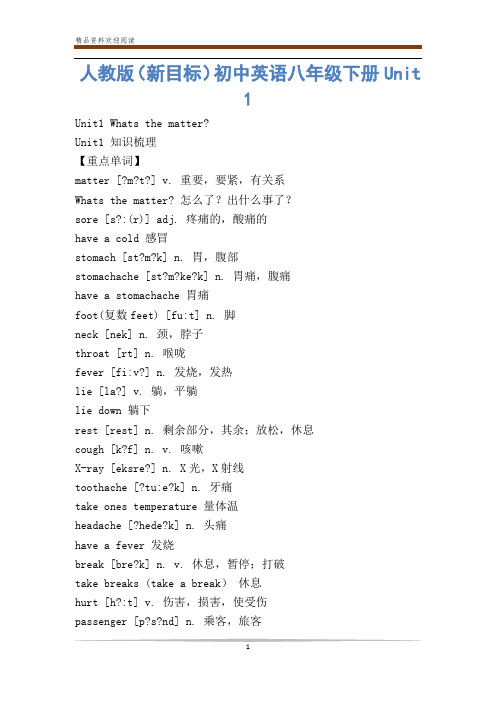
人教版(新目标)初中英语八年级下册Unit1Unit1 Whats the matter?Unit1 知识梳理【重点单词】matter [?m?t?] v. 重要,要紧,有关系Whats the matter? 怎么了?出什么事了?sore [s?:(r)] adj. 疼痛的,酸痛的have a cold 感冒stomach [st?m?k] n. 胃,腹部stomachache [st?m?ke?k] n. 胃痛,腹痛have a stomachache 胃痛foot(复数feet) [fu:t] n. 脚neck [nek] n. 颈,脖子throat [rt] n. 喉咙fever [fi:v?] n. 发烧,发热lie [la?] v. 躺,平躺lie down 躺下rest [rest] n. 剩余部分,其余;放松,休息cough [k?f] n. v. 咳嗽X-ray [eksre?] n. X光,X射线toothache [?tu:e?k] n. 牙痛take ones temperature 量体温headache [?hede?k] n. 头痛have a fever 发烧break [bre?k] n. v. 休息,暂停;打破take breaks (take a break)休息hurt [h?:t] v. 伤害,损害,使受伤passenger [p?s?nd] n. 乘客,旅客off [?f] adv. prep. 离开(某处);从去掉get off 下车to ones surprise 使惊讶,出乎意料onto [nt?] prep. 向,朝trouble [?tr?bl] n. 麻烦,烦扰,问题hit [hit] n. v. 碰撞,打,打击right away 立即,马上get into 陷入,参与herself [h?:?self] pron. 她自己,她本身(she的反身代词)bandage [b?nd?d?] n. v. 绷带;用绷带包扎sick [s?k] adj. 患病的,不适的knee [ni:] n. 膝盖nosebleed [?nzbli:d] n. 鼻出血breathe [bri:e] v. 呼吸sunburned [?s?nb?:nd] adj. 晒伤的ourselves [ɑ:?selvz] pron. 我们自己(we的反身代词)climber [?kla?m?(r)] n. 登山者be used to 习惯于适应于risk [r?sk] n. v. 风险,危险;冒险take risks (take a risk) 冒险accident [ksid?nt] n. 意外事件;事故situation [?sitju?ein] n. 状况,形式,情况kg=kilogram [?k?l?gr?m] n. 公斤,千克rock [r?k] n. 岩石run out (of) 用尽,耗尽knife [naif] n. 刀,餐刀cut off 切除blood [bl?d] n. 血mean [mi:n] v. 意味着,意思是,意欲get out of 离开,从出来importance [?m?p?:tns] n. 重要性decision [d?sn] n. 决心,决定,抉择control [k?ntrl] v. 控制,支配,操纵be in control of 掌管,管理spirit [sp?r?t] n. 勇气,意志death [de] n. 死亡give up 放弃nurse [n?:s] n. 护士【重点短语】1.have a fever 发烧2.have a cough 咳嗽3.have a toothache 牙疼4.talk too much 说得太多5.drink enough water 喝足够的水6.have a cold 受凉;感冒7.have a stomachache 胃疼8.have a sore back 背疼9.have a sore throat 喉咙痛10. take risks 冒险11.hot tea with honey 加蜂蜜的热茶12.see a dentist 看牙医13.get an X-ray 拍X 光片14.take one s temperature 量体温15.put some medicine on sth. 在上面敷药16. give up 放弃17. sound like 听起来像18. all weekend 整个周末19. in the same way 以同样的方式20. go to a doctor 看医生21. go along 沿着走22. on the side of the road 在马路边23. shout for help 大声呼救24. without thinking twice 没有多想25. get off 下车26. have a heart problem 有心脏病27. to one s surprise 另某人惊讶的是28. thanks to 多亏了;由于29. in time 及时30. make a decision 做出决定31. get into trouble 造成麻烦32. right away 立刻;马上33. because of 由于34. get out of 离开;从出来35. keep on doing sth. 继续或坚持做某事36. put a bandage on sth. 用绷带包扎37. fall down 摔倒38. feel sick 感到恶心39. have a nosebleed 流鼻血40. cut his knee 割伤他的膝盖41. put her head back 把她的头向后仰42. have problems breathing 呼吸困难43. mountain climbing 登山运动44. be used to doing sth. 习惯做某事45. run out (of) 用完;用尽46. so that 以便47. so...that... 如此以至于...48. be in control of 掌管;管理49. in a difficult situation 在闲境中【重点句型】1. Whats the matter with you?= Whatthe trouble with you?= Whats wrong with you? 你怎么了?2. What should she do? 她该怎么办呢?3.Should I take my temperature? 我应该量一下体温吗?4.You should lie down and rest. 你应该躺下休息一会儿。
八年级英语下册全册电子版教案【名师版】
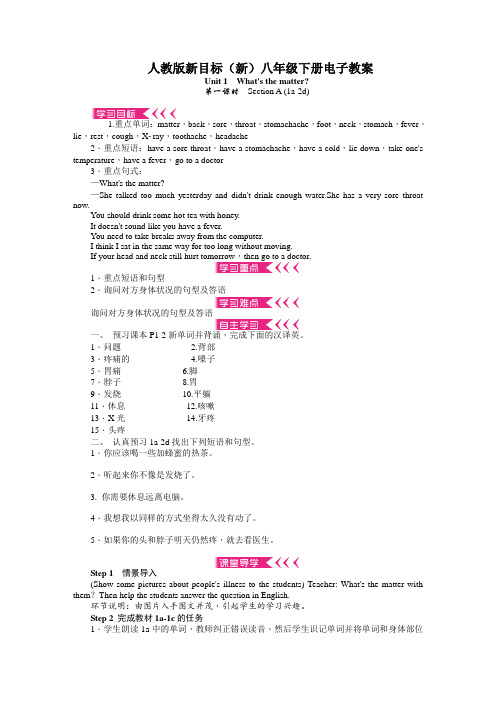
人教版新目标(新)八年级下册电子教案Unit 1What's the matter?第一课时Section A (1a-2d)1.重点单词:matter,back,sore,throat,stomachache,foot,neck,stomach,fever,lie,rest,cough,Xray,toothache,headache2.重点短语:have a sore throat,have a stomachache,have a cold,lie down,take one's temperature,have a fever,go to a doctor3.重点句式:—What's the matter?—She talked too much yesterday and didn't drink enough water.She has a very sore throat now.You should drink some hot tea with honey.It doesn't sound like you have a fever.You need to take breaks away from the computer.I think I sat in the same way for too long without moving.If your head and neck still hurt tomorrow,then go to a doctor.1.重点短语和句型2.询问对方身体状况的句型及答语询问对方身体状况的句型及答语一、预习课本P1-2新单词并背诵,完成下面的汉译英。
1.问题____________ 2.背部____________3.疼痛的____________ 4.嗓子____________5.胃痛____________ 6.脚____________7.脖子____________ 8.胃____________9.发烧____________ 10.平躺____________11.休息____________ 12.咳嗽____________13.X光____________ 14.牙疼____________15.头疼____________二、认真预习1a-2d找出下列短语和句型。
新目标(人教) 八年级下册英语教学课件 Unit1 Section B(1a-1d)

bandage press sick kneeห้องสมุดไป่ตู้
nosebleed
n.绷带 v.用绷带包扎 v. 压;按;挤 adj. 生病的;有病的 n. 膝;膝盖 n.鼻出血
bandage n. 绷带 v. 用绷带包扎
1. His leg was hurt. Please put a bandage on it . (n.名词)
A. I fell down from the stairs. B. Do you have a sore back? C. What's wrong with you? D. Remember to put some ice on your knee. E. When did it start? F. But you should get an X-ray. G. Can I have a look at it ?
you hurt it? B: 3._____A______.
A: I see. Well, I don't think it's serious. 4.___F______ . Let the nurse take you to the third floor(楼层) and come back with your X-ray. And then I will know if your knee is broken or not.
B: OK. I will. (After ten minutes)
A: Let me have a look. Nothing seems to be broken. I think all you need is some rest. 5._____D_______ .
人教新目标八年级英语下册语法讲义:Unit1What'sthematter?

Unit 1What's the matter?1.I have a stomachache.我胃痛。
(1)stomachache为可数名词,意为“胃痛;腹痛”。
在英语中,一部分表示身体部位的名词加上名词ache(疼痛),可以构成合成名词。
如:headache头疼;toothache牙痛;backache背痛。
(2)have a+以上合成名词,表示“……痛”。
如:Mary didn't come to school yesterday because she had a stomachache.昨天玛丽因为胃痛没来上学。
2.drink some hot tea with honey喝一些加蜂蜜的热茶(1)with作介词,意为“具有;带有”,表示某物带有或具有某种特征。
如:She is a girl with big eyes.她是一个大眼睛女孩。
(2)反义词为without,意为“没有”。
如:I think I sat in the same way for too long without moving.我想我保持同一个姿势一动不动地坐太久了。
3.see sb. do sth.和see sb. doing sth.的区别(1)see sb. do sth. 意为“看见某人做某事”(看到动作发生的全过程或经常看到动作发生)。
如:I often see him play basketball on the playground.我经常看见他在操场上打篮球。
(2)see sb. doing sth. 意为“看见某人正在做某事”(强调动作正在发生)。
如:I saw him playing basketball on the playground just now.刚才我看见他正在操场上打篮球。
八下英语unit1译林版教案

八下英语unit1译林版教案Unit 1: The World of Our Senses A Teaching Plan for Grade 8 English (译林版)。
Introduction:Unit 1 of the Grade 8 English curriculum focuses on the theme "The World of Our Senses." This unit aims to help students understand the importance of the five senses in our daily lives and how they contribute to our perception of the world around us. Through a variety of activities, discussions, and readings, students will explore the role of the senses in communication, observation, and understanding.Objectives:To develop students' understanding of the five senses and their importance in daily life.To improve students' ability to use descriptive language to express sensory experiences.To encourage students to think critically about therole of the senses in communication and perception.To provide opportunities for students to practice using the five senses in different contexts.Key Vocabulary:Sight, hearing, taste, touch, smell。
人教版新目标(go for it)英语八年级下册英语全册教案

人教版新目标八年级下册英语教学计划Co ntents(教案目录)Unit 1 What's the matter?......................................................1(6课时)Unit 2 I'll help to clean up the city park...............................25(6课时)Unit 3 Could you please clean your room?.........................48(6课时)Unit 4 Why don't you talk to your parents? ........................70(6课时)Unit 5 What were you doing when the rainstorm came? ...94(6课时)Unit 6 An old man tried to move the mountains. ...............117(6课时)Unit 7 What's the highest mountain in the world? ...........139(6课时)Unit 8 Have you read Treasure Island yet? .......................156(6课时)Unit 9 Have you ever been to a museum? ..........................173(6课时)Unit 10 I've had this bike for three years. ..........................187(6课时)周星期2015年_月__日第周星期总第__课时2015年__月__日第周星期总第__课时2015年_月__日第周星期总第__课时2015年_月__日第周星期总第__课时2015年_月__日第周星期总第__课时2015年_月__日第周星期总第__课时2015年_月__日第周星期总第__课时2015年_月__日第周星期总第__课时2015年_月__日第周星期总第__课时2015年_月__日第周星期总第__课时2015年_月__日第周星期总第__课时2015年_月__日第周星期总第__课时。
鲁教版英语(五四制)八年级下册_Unit1_单元教材分析
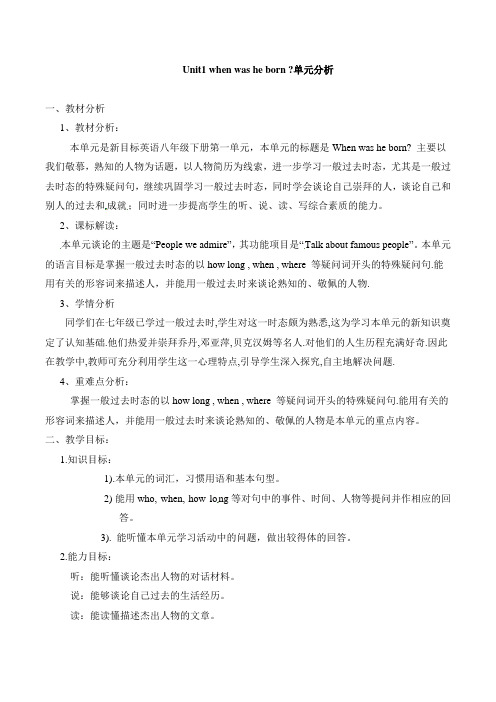
I first ….when I was … years old. I was/felt happy/tired/excited.
3、学情分析
同学们在七年级已学过一般过去时,学生对这一时 态颇为熟悉,这为学习本单元的新知识奠定了认知基础.他们热爱并崇拜乔丹,邓亚萍,贝克汉姆等名人.对他们的人生历程充满好奇.因此在教学中,教师可充分利用学生这一心理特点,引导学生深入探究,自主地解决问题.
4、重难点分析:
掌握一般过去时态的以how long , when , where等疑问词开头的特殊疑问句.能用有关的形容词来描述人,并能用一般过去时来谈论熟知的、敬佩的人物是本单元的重点内容。
重要句型概览
Who’s that? That’s Deng Yaping.
What’s her job? She is a great ping-pong player.
When was she born? She was born in 1973.
When did she become a ping-pong player?
Unit1 when was he born ?单元分析
一、教材分析
1、教材分析:
本单元是新目标英语八年级下册第一单元,本单元的标题是When was he born?主要以我们敬慕,熟知的人物为话题,以人物简历为线索,进一步学习一般过去时态,尤其是一般过去时态的特殊疑问句,继续巩固学习一般过去时态,同时学会谈论自己崇拜的人,谈论自己和别人的过去和 成就 ;同时进一步提高学生的听、说、读、写综合素质的能力。
have a party举行 一次聚 会was(were) born出生于
新目标(人教) 八年级下册英语教学课件 Unit1 Section A(GF-4c)

4b Circle the best advice for these health problems. Then add your advice.
1. Jenny cut herself. She should (get an X-ray / put some medicine on the cut). My advice:
I hurt my back when I fell off my bike.
⑤ sb. get/got hit on the +身体部位. e.g. He got hit on his head when he passed by the
playground.
3. ache, sore和hurt 的区别: (1)ache 是一个名词后缀,表示某部位疼痛。
some sleep/rest; have colds; fall down. ➢ Key sentences:
1. Did you hurt yourself playing soccer? 2. You should go home and get some rest. 3. Should we go to school? ➢To learn the usage of should and reflexive pronoun.
1) Did you buy anything for yourself? 你为你自己买什么东西了吗?(做介词宾语)
2) The old man taught himself English. 那位老人自学英语。(做动词宾语)
3) The thing itself is not important. 事情本身并不重要。(做同位语)
see a doctor in time
八年级英语下册_Unit1_Will_people_have_robots导学案_人教新目标版
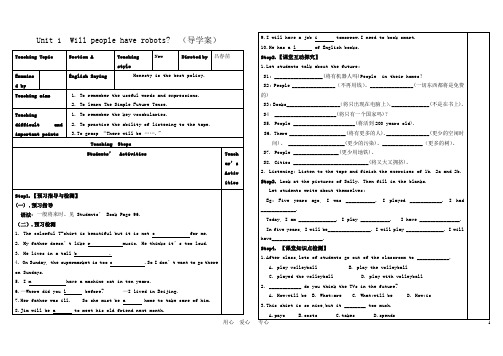
8.Jim will beato meet his old friend next month.
9.I will have a jobitomorrow.I need to book smart.
S8. Cities ____________________________(将又大又拥挤)。
2. Listening: Listen to the tape and finish the exercises of 1b. 2a and 2b.
Step3.Look at the pictures of Sally. Then fill in the blanks.
A. play volleyballB. play the volleyball
C. played the volleyballD. play with volleyball
2. ____________ do you think the TVs in the future?
A. How;will beB. What;areC. What;will beD. How;is
—______ ______ be a meeting tomorrow?—No, _________ _________.
22.The child will take the bus to school.(改为否定句)
The child ____________ ____________ the bus to school.
5. ________ students in my school are interested in listening to music.
新目标(人教) 八年级下册英语教学课件 Unit1 Section A(1a-1c)

He has a toothache.
She has a cough.
1a
Look at the picture. Write the correct letter [a-m] for each part of the body.
Check the answers!
__h_ arm _e__ back __a_ hand __j_ head _d__ neck _m__ nose
e.g. Lily had a heart problem. I have a headache now because I stayed up too late last night. She had a sore back after climbing the mountain.
3. She talked too much yesterday and didn't drink enough water. 她昨天说话太多了又没有喝足够多的水。 too much 的用法: ①作形容词词组,修饰不可数名词。
e.g. The students have too much homework. ②作副词词组,修饰动词。
e.g. Don't watch TV too much. ③作名词词组。
e.g. He has given me too much.
辨析:too much /much too/ too many much too 意为“太”,用于加强语气,常用来修饰形容词或副词。 e.g. The question is much too difficult for me. too many 意为“太多的”,用来修饰可数名词复数形式。 e.g. There are too many people in the station.
人教新目标初中英语八年级下册 Unit1 sectionA 1a-2d 课件
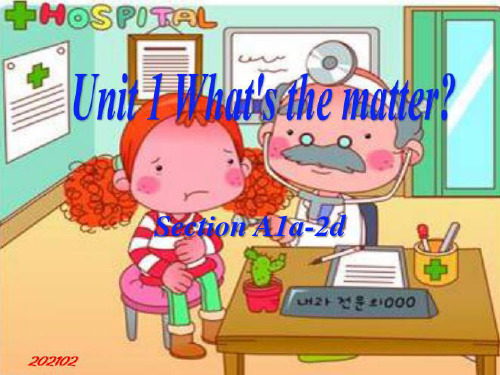
3.主语 + have a + 身体部位+ache
stomachache headache oothache backache
4.主语 + have a + pain+in/on+身体部位
She has a pain in her stomach.
46.MMrr.. JJeennkkininsswaliskoefdtenalalskkeidndtos doinfnderelbieccioause foo.dA.. heAlsikeadn
9
16.You should put some medicine on it.
1.What’s the matter with Lisa? 2.What did she do on the weekend? 3.What does she need to do ?
我想我以同样的姿势一 动不动地坐得太久了。
the doctor said. He found something was wrong with his heart a
few months later. Now he thought the doctor was right. And he
had“Ytooubeminushtolsopsietawl.eight(减肥),sir,” said the doctor, “unless
ithmepdoerltiacniotusoffofoicder,Bh. hee wass reoafdteynto haseklpedothteorsCd.inhneewr.as The
sfrhieonpdkleyetpoetrhsetsrhieodpk课tehee堂pier训rsbe练st-t阅o 读faw理n解on(巴结)him. They
人教版新目标英语八年级下册教案全册(共50份)

人教版新目标英语八年级下册教案全册(共50份)Unit 3 Could you clean up your room?Section B (1a~1e)教学目标【知识与技能】1. 掌握本单元单词并正确使用以下常用表达法:buy some drinks and snacks, borrow some money, invite sb. to the party, make your bed…2. 能熟练掌握并使用下列重点句式:—Could you clean your room? —Yes, I can. —Could I invite my friends to a party? —No, you can’t have the party•Unit 3 Could you clean up your room?Section B (2a~3b)教学目标【知识与技能】1. 学习并掌握新词汇:chore; waste, provide, depend, drop等。
2. 能正确使用以下常用表达:a waste of time, provide sth. for sb., mind doing sth., take care of, depend on等。
3. 学会使用以下句型:they don’t have time… they should spend time on… it’s not enough to…, the+比较级,•Unit 3 Could you clean up your room?Section B (self check)教学目标【知识与技能】1. 学习并掌握新词汇:fair, unfair等。
2. 能正确使用以下常用表达:do chores; it’s fair/unfair for sb. to do sth.3. 注意正确搭配下列重点句式:do, clean, make, fold, sweep, take out4. 能熟练掌握并使用下列重点句式:I think/believe/agree that…; Can I/you…?【情感、态度与价值观】让学生学会征求他人的许可,并学会有礼貌地请•Unit 3 Could you please clean your room?Section A(1a~2d)教学目标【知识与技能】1. 掌握重点词汇rubbish,fold,sweep, floor, mess, take out the rubbish, fold the clothes, sweep the floor, all the time, make the bed, go out for dinner2. 掌握以下句型: 1.—Could you please sweep the floor? —Yes,sure.2.—Co•Unit 3 Could you please clean your room?Section A(3a~4c)教学目标【知识与技能】1. 学习掌握下列词汇:throw, neither, shirt, pass, borrow, lend, finger, hate, while, throw down, take the dog for a walk, be angry with, all the time, as soon as2. 句型:① For one week, she did not do any housework and neither did I.②—Could I b。
- 1、下载文档前请自行甄别文档内容的完整性,平台不提供额外的编辑、内容补充、找答案等附加服务。
- 2、"仅部分预览"的文档,不可在线预览部分如存在完整性等问题,可反馈申请退款(可完整预览的文档不适用该条件!)。
- 3、如文档侵犯您的权益,请联系客服反馈,我们会尽快为您处理(人工客服工作时间:9:00-18:30)。
Section A 1a-2d【学习目标】1.识记并准确运用身体部位的词汇。
2.学会询问他人身体健康状况。
【学习重点和难点】重点:识记身体部位的多个词;掌握多个询问他人身体健康状况的问法。
难点:不同身体部位不舒服的表达方法。
【学法指导】自主互助学习知识链接:结合三组学生的表演及课本Page7上的对话总结三种询问他人身体健康状况的句子:1. ___________________________________________________;2._____________________________________________________;3.____________________ _________________________________【目标评价】提问,演板,书面小测试。
【学习过程】1. 浏览1a部分,借助单词表完成1a。
2. 师生讨论结果并朗读它们。
3. 积极参与识别身体部位词汇的游戏。
4. 浏览课本图片中的对话后完成下列词组:怎么了__________________; 感冒了_______________;背酸痛______________;胃痛,肚子痛___________________;喉咙痛_______________________。
5. 浏览1b要求及所给名称,弄清要求及准确掌握5个名字的发音。
6. 弄清1-5几个人所在位置。
7. 听录音并按要求完成1b。
8. 讨论答案并再放录音,要求学生大声重复。
并再次完成下列词组:怎么了__________________; 感冒了______________;背酸痛_______________;胃痛,肚子痛___________________;喉咙痛______________;牙疼___________;头疼_________________________;9. 查阅字典或者资料完成下列词组:咳嗽____________________;打喷嚏___________________;发烧_______________________;10. 小组讨论以上表述身体健康问题的词组可分几种类型并按照类型罗列在下边空白处。
11. 两人一组编造对话(注意要有表演)。
12. 争取机会表演对话。
【拓展巩固】说出身体部位的词及表述身体部位疼痛的三种类型;说出询问别人身体状况的三种问法及如何回答;注意foot、tooth的复数形式。
【课堂练习】写出下列表身体部位疼痛的词汇。
For example: head headachetooth _____________;stomach ______________;back ________ __________;throat _______ ______;back _______ __________;neck _________ __________;【作业设计】一、根据首字母提示及句意填写单词(基础过关)1. What's the m________ with you?2. We hear with our e________ and see with our e________.3. He usually goes to school on f________.4. I have a t__________, so I want to see a dentist.二、用所给词的正确形式填空(基础巩固)1. -- What’s the matter?-- I have a ____________ ( stomach)2. My sister didn’t go to school because she has a ____________ (tooth).3. Look! Our baby has three ___________ (tooth) now.4.--What’s the matter with your father? He talks less than before.--Oh, he _______ (have) a sore throat三、同意句互换(能力提升)1. What’s up with you? (同义句)What’s _____ _____ with you?2. My back hurts.(痛)(同义句)I have _____ ______ back.【总结反思】Section A 3a-3c【学习目标】1、重点单词:passenger, onto, trouble, hit, off2、短语:get off, to one’s surprise, right away, get into3、句型:What should she do? She should take her temperature. Should I put some medicine on it? Yes, you should. / No, you shouldn’t.【重点】使用should, shouldn’t 给出合理的建议。
【难点】根据不同的病症给出多个合理建议。
【课前热身】短语翻译:1、休息_____________________2、没有移动_______________3、以相同的方式_________________4、听起来像_____________5、割伤自己____________________6、让自己受伤____________________7、在伤口上敷点药_______________________8、跌倒__________________【自学提示】1. the No.26 was going along Zhonghua Road when the driver saw an old man lying on the side of the road.1)此句中bus No. 26 was going along Zhonghua Road 使用的是过去进行时,它的构成是were/was+doing2)When 常常用来引导时间状语从句,当放在过去进行时构成的主句之后时,表示“某事正在进行时,另一件事情发生了”。
3)See somebody doing something 表示“看到某人正在从事某事或正处于某种状态”。
2. think twice 是英语中一种固定的表述,表示在做某事之前“认真思考;权衡利弊”。
3. Thanks to Mr. Wang and the passengers, the doctors saved the man in time. 多亏了王先生和乘客们,医生及时挽救了老人的生命。
Thanks to someone/something 表示“多亏;因为;由于”的意思。
【合作探究一】1、小组成员轮流读3a并翻译,划出疑难准备提问。
2、共同划出你们认为重要的短语、句子,写在小黑板上。
【达标检测】一、完成下列句子1、你还好吗?Are you _____?2、我该怎么办?_____ should I _____?3、我应该量体温吗?Should I _____ ____ ________________?4、我头疼。
I have ___ ________________.5、你周末做什么了? What _____ you _____ on the _________?6、你应该离开电脑休息一下。
You need to _____ ________ ______ _______ the computer.7、我认为你应该躺下来休息。
I think you should ______ ______ and rest.二、单项选择1、( ) I didn’t sleep well last night, because I _____ a toothache .A. wasB. wentC. hadD. took2、( )—Tony, What’s ___ matter with you?— I have _____ toothache.A. a; theB. the; aC. /; theD. the; /3、( ) Mr. Smith eats ______ food, so he’s _____ fat.A .much too; too muchB .too many; much tooC. too much; too muchD. too much; much too4、( )—Why are you so tired these days?—Well, I have ________ homework to do.A. too muchB. too manyC. much tooD. many too5、( ) You ____ be quiet when you are in the reading room.A. shouldB. shouldn’tC. canD. can’t6、( )You _____ drive your car so fast. It’s very dangerous.A. wouldn’tB. shouldn’tC. couldn’tD. mightn’t7、( ) David needs ______ a good rest.A. hasB. to haveC. have8、( )—I'd like a cup of black coffee. What about you, Maggie?—I prefer coffee ________ sugar.A. thanB. forC. withD. to9、( ) The boy isn’t ___ to dress himself.A. old enoughB. enough oldC. old10、( ) —I’m sorry to break your pen.—_______A. That’s rightB. It doesn’t matterC. Thank you【课后作业】A组:Copy the new words and phrases and retell 3aB组:Copy the new words and phrases and copy 3a, then translate【教师反思】【学生反思】Section A 4a-4c【学习目标】1.知识技能目标掌握并灵活运用本课的重点词汇herself重点短语give advice, fall down, go home and rest, cut herself, have colds 语法重点:反身代词和情态动词should的用法2.情感态度目标主动关心身体不适的人并给予适当的建议【重点难点】使用should, shouldn’t 给出合理的建议。
